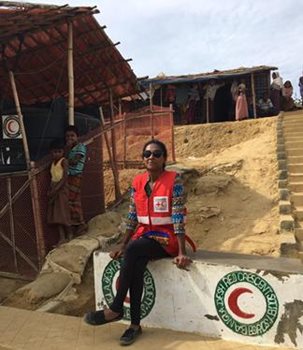By Yassen Atallah
Since August 25, 2017, more than 700,000 people have fled violence in Myanmar’s Rakhine State for Bangladesh. Dealing with a protracted crisis such as this is a complex operation, one that involves a host of different organizations. Effective coordination in the response is essential to ensure that supporting those most in need of humanitarian assistance remains the number one objective.

Sharonya Sekhar, the Senior Policy Advisor, Global Relations & Humanitarian Diplomacy for the Canadian Red Cross, knows when working in these complex situations, understanding the context of the humanitarian situation is essential to carrying out an effective response. She has been on a humanitarian diplomacy mission for the past three months in Bangladesh with the International Federation of Red Cross and Red Crescent Societies (IFRC).
In Bangladesh, Sharonya’s main focus is advocacy and humanitarian diplomacy in support of the displaced population and local host communities, strategizing on how to effectively use our Red Cross Red Crescent voice to encourage decision makers to act in the best interests of those most vulnerable.
To do this, she works closely with the Bangladesh Red Crescent Society and a number of Red Cross Red Crescent organizations on the ground, including the Canadian Red Cross, to identify needs and priorities. She also liaises with international organizations (including many United Nations agencies) and local non-governmental organizations that are particularly critical to fostering a sustainable humanitarian response.
Sharonya said one of the most important aspects that enables her to do her job well is building good relationships; “You can have evidence, but people need to be receptive.” Having good communication skills and having strong evidence to support her recommendations are also key to success in her field.
When asked about some of the greatest challenges she faces in her current mission, Sharonya mentioned that the scale and scope of the crisis is quite immense. There is no simple solution to this situation. Furthermore, while there are a large number of organizations devoted to improving the situation in Bangladesh, coordination among them is a difficult task. Humanitarians like Sharonya also have to keep an eye on the fragile political dynamics in neighbouring countries, as they have direct consequences in Bangladesh and for the displaced individuals.
Despite these challenges, Sharonya feels great pride in the Bangladesh Red Crescent, and mentions that the highlight of her mission is working with the affected population and observing their “remarkable resilience.”
By the end of her six-month journey, Sharonya hopes the challenges she’s experienced along the way will pay off. Appreciative of how humanitarian diplomacy is an effective tool to deal with complex emergencies, her goal is to leave behind tools and information for others to carry on this important work. She knows that the Bangladesh Red Crescent is already a strong actor in their own country and that they, alongside all Red Cross and Red Crescent partners, will continue to provide critical humanitarian assistance to affected populations in this crisis.
Learn more about
what humanitarian diplomacy entails.
Yassen Atallah is a fourth-year International Relations student at the University of British Columbia. His research is currently devoted to understanding how states, intergovernmental organisation, nongovernmental organisation, multinational corporations, and other non-state actors are able to cooperate in the global governance of global environmental and health issues.
Related stories: